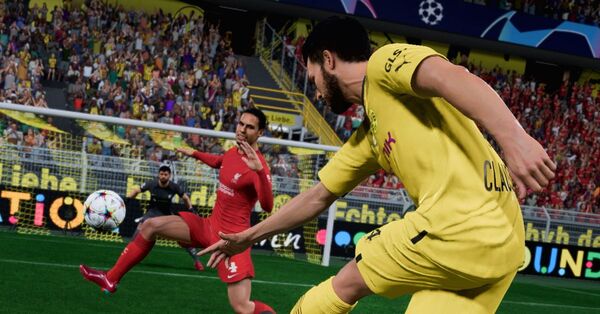Microtransactions have long been a controversial aspect of the FIFA series, and FIFA 23 is no exception. With Ultimate Team (FUT) remaining a highly profitable feature for EA Sports, microtransactions allow players to purchase packs and build their dream teams—but at a cost. This article will explore the effects of microtransactions on FIFA 23 gameplay, team-building, player morale, and the ongoing debate over fairness and accessibility.
H2: The Role of Microtransactions in FIFA 23

FIFA 23
Since its introduction, Ultimate Team (FUT) has become a significant revenue driver for EA Sports. In FIFA 23, microtransactions allow players to buy packs to unlock players, items, and upgrades, helping them to strengthen their teams quickly rather than relying solely on in-game rewards.
H3: How Packs and Points Work
Players can purchase FIFA Points, which are then used to buy packs containing player cards of varying quality. The contents of these packs are random, and the best players are extremely rare, leading to a pay-to-win element for those willing to spend more on packs.
H2: Advantages of Microtransactions for Casual Players
One benefit of microtransactions is that they give casual players an opportunity to compete with more advanced players by obtaining high-quality players through packs. This can be particularly helpful for players who don’t have the time to grind for coins and rewards in FUT modes.
H3: Faster Team Progression and Improved Experience
Microtransactions allow casual players to build strong teams faster, which can enhance their gaming experience. By purchasing packs, players have a better chance of creating competitive teams that they may not otherwise achieve, especially if they are playing only a few hours each week.
H2: Pay-to-Win Concerns Among the Community
One of the main criticisms of microtransactions in FIFA 23 is the perception that it creates a pay-to-win environment. Players who invest money in packs tend to build stronger teams more quickly, creating an imbalance in the competitive FUT modes where weaker teams can’t keep up.
H3: Fairness Issues in FUT Competitions
Many FUT players argue that microtransactions diminish the fairness of competitive play. When two players face off, one with a purchased, high-quality squad and the other relying on organically-earned players, the result often skews towards the higher-investment team, discouraging those who play without spending.
H2: Addiction Risks and the “Pack Opening” Experience
The randomized nature of packs in FIFA 23 taps into the same psychological mechanisms as gambling, making it tempting for players to continue spending to chase rare, top-tier players. This practice has raised concerns about the potential for addiction, especially among younger players.
H3: The “Chase” for Top Players
Opening packs can be thrilling, particularly when players score rare or high-rated cards. However, the thrill of receiving a top player often leads to more spending, and many players report feeling compelled to buy additional packs to improve their team.
H4: Regulatory Concerns and Age Restrictions
Various countries have begun to examine the ethics of loot boxes, including FIFA packs, with some arguing that they qualify as gambling and should be restricted. Regulatory bodies have raised questions about whether these mechanisms should be accessible to younger audiences without proper guidance or warnings.
H2: How Microtransactions Impact Team-Building Strategy
Microtransactions not only influence gameplay but also affect how players approach team-building. Those who invest heavily can afford high-rated players from top leagues, while players without extra spending face more limitations in assembling competitive squads.
H3: Limited Squad Choices for Non-Spending Players
For players who do not use microtransactions, building a competitive team can be a slow and challenging process. These players have to rely on rewards, trading, and grinding in-game challenges, making it harder to compete with teams built through purchases.
H2: Market Inflation and the Influence of Microtransactions
The in-game FUT market is largely influenced by the number of players using microtransactions. As more players buy packs, rare players become more valuable, driving up their prices and creating an inflated market.
H3: Increased Player Prices for Key Players
The influx of purchased packs introduces more coins into the FUT economy, driving up demand and prices for top-tier players. This inflation makes it difficult for non-spending players to afford the best players, further increasing the divide between those who spend and those who do not.
H2: Community Backlash and EA’s Response
Microtransactions have led to vocal criticism from the FIFA community, with many feeling that FUT is more focused on profit than player satisfaction. EA has faced significant backlash over the years, and the controversy surrounding FIFA 23 is no different.
H3: EA’s Adjustments to Pack Odds and Transparency
In response to criticism, EA introduced transparency measures, like disclosing pack odds to show the probability of getting high-rated players. This change aimed to give players more information about their purchases, but it has not fully alleviated concerns about the fairness of microtransactions.
H2: The Future of Microtransactions in FIFA Games
With FIFA 23 being one of the last titles before the franchise transitions to EA Sports FC, players are curious about whether EA will continue its reliance on microtransactions or make changes in response to community feedback.
H3: Potential for Alternative Revenue Models
Some in the community have suggested alternative revenue models, like a battle pass or monthly subscription, to reduce reliance on microtransactions. These models could provide steady income for EA while addressing concerns around fairness and accessibility.
H2: Tips for Playing FUT Without Microtransactions
For players who wish to enjoy FUT without purchasing packs, there are strategies that can help maximize success in FIFA 23. Here are a few methods to remain competitive without spending extra money:
H3: Emphasize Trading and Market Awareness
Understanding the FUT market is crucial for non-spending players. By buying and selling players wisely, they can earn coins without relying on microtransactions. Knowing when to buy and sell is key to profiting from the in-game market.
H4: Focus on Squad-Building Challenges and Objectives
Engaging in Squad Building Challenges (SBCs) and completing daily or weekly objectives can yield valuable rewards. By completing SBCs efficiently, players can accumulate better players and resources without spending money.
Conclusion
Microtransactions in FIFA 23 have significantly impacted the FUT experience, creating a divide between players who spend and those who don’t. While microtransactions offer convenience for casual players and generate substantial revenue for EA, they also raise fairness and ethical concerns. As the gaming industry faces increased scrutiny over loot box mechanics, the future of microtransactions in FIFA remains uncertain. Addressing these issues will be crucial in building a fair, enjoyable experience for all players.


